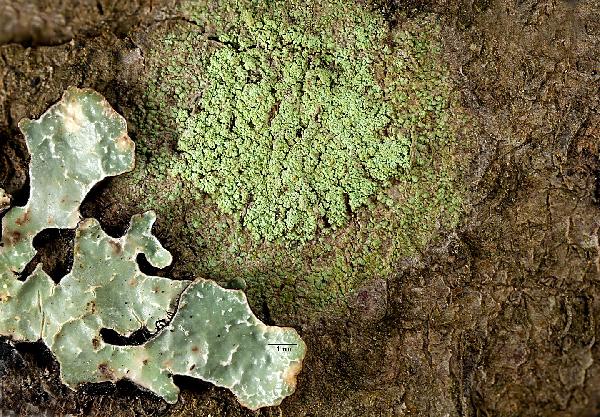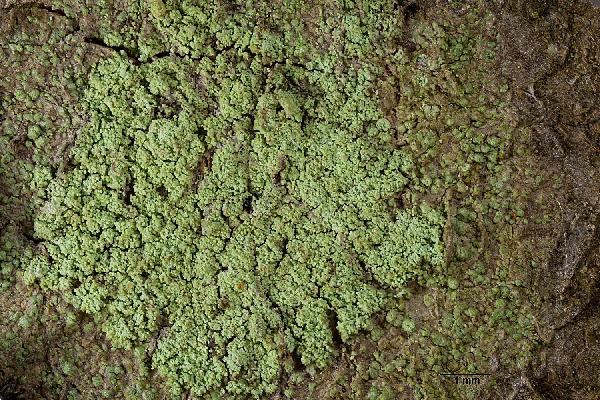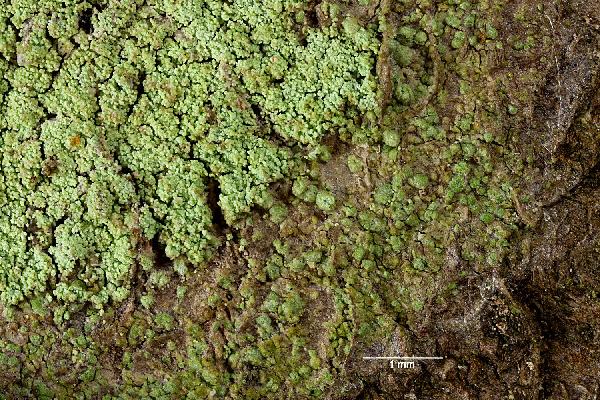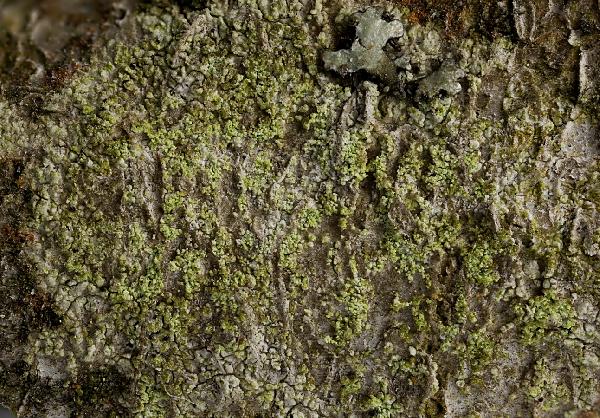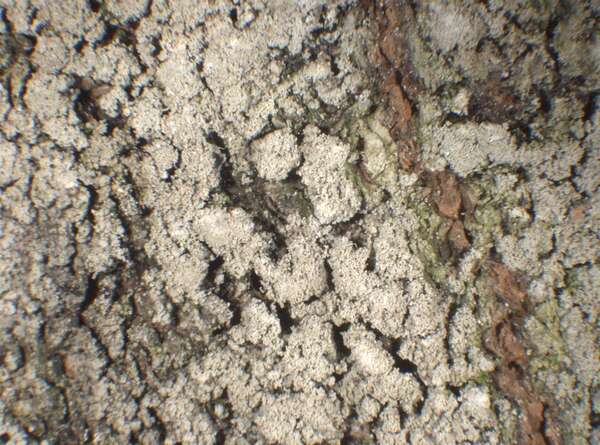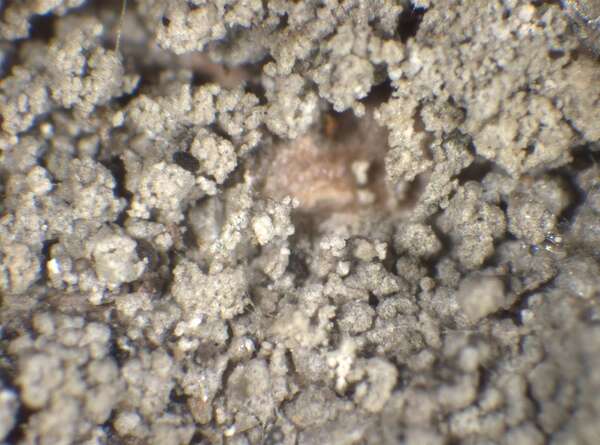Ropalospora viridis (Tønsberg) Tønsberg
Sommerfeltia, 14: 293, 1992. Basionym: Fuscidea viridis Tønsberg in Culberson & al. - Mycologia, 76: 156, 1984.
Synonyms:
Description: Thallus crustose, episubstratic, areolate and sorediate, forming orbicular, up to 3 cm wide (or more), irregular patches, occasionally confluent with other thalli and covering much wider areas; prothallus very variable, from well-developed and brown-zoned to poorly developed and shiny, rarely indistinct. Areoles greyish green, matt, rounded, convex, up to 0.2 mm wide. Soralia bursting from the apices of the areoles, green, yellow-green or straw-coloured, irregularly rounded, often becoming confluent, especially towards the centre, forming a more or less continuous subleprose crust, the soredia farinose, 20-30 μm in diam., sometimes loosely packed into larger consoredia. Apothecia very rare, lecideine, black, 0.2-0.4 mm across, with a flat disc and a persistent proper margin. Proper exciple brown in outer part, pale brown within, of c. 2 μm wide, evenly thickened, often tortuous hyphae with at least some lumina which are >4 times as long as wide; epithecium brown; hymenium colourless, 50-75 μm high, non-amyloid, inspersed with oil droplets; paraphyses easily becoming free, mostly simple, 1.5-2 μm thick, the apical cells not or only slightly thickened; hypothecium pale brown. Asci 12-16-spored, clavate to broadly clavate, with a non-amyloid wall and a thin and weakly developed tholus in mature asci, K/I+ deep blue. Ascospores 5-6-septate, hyaline, clavate, straight to curved; 22-31(-44) x (1.7-)2-2.5(-3.7) μm. Photobiont chlorococcoid. Spot tests: K-, C-, KC-, P-, soralia UV+ white. Chemistry: perlatolic acid (major), hyperlatolic-, isohyperlatolic- and superlatolic acids (minor or traces).
Growth form: Crustose
Substrata: bark
Photobiont: green algae other than Trentepohlia
Reproductive strategy: mainly asexual, by soredia, or soredia-like structures (e.g. blastidia)
Commonnes-rarity: (info)
Alpine belt: absent
Subalpine belt: absent
Montane belt: very rare
Dry submediterranean belt: extremely rare
Humid submediterranean belt: absent
Padanian area: absent
pH of the substrata:
1 2 3 4 5
Solar irradiation:
1 2 3 4 5
Aridity:
1 2 3 4 5
Eutrophication:
1 2 3 4 5
Poleotolerance:
0 1 2 3
Altitudinal distribution:
1 2 3 4 5 6
Rarity
absent
extremely rare
very rare
rare
rather rare
rather common
common
very common
extremely common
Loading data...
Occurrence data
Predictive map
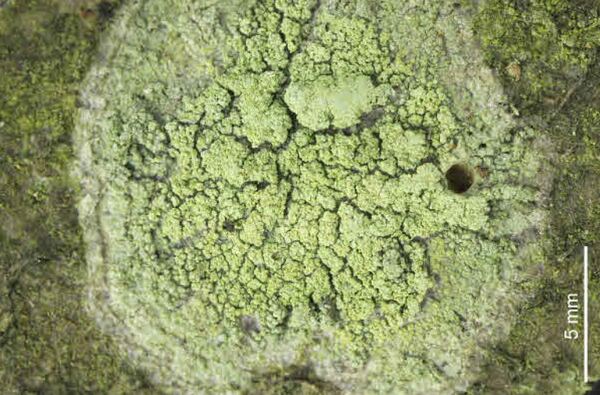
Felix Schumm – CC BY-SA 4.0
[16640], Germany, Rheinland-Pfalz, Naturpark Pfälzer Wald, ca. 2 km südlich von Hofstätten, am Weg zum Annweiler Forsthaus, 49.260193° N, 7.891891° E, 291 m. Leg. V. John, 03.09.2010 (BLAM-Exkursion)
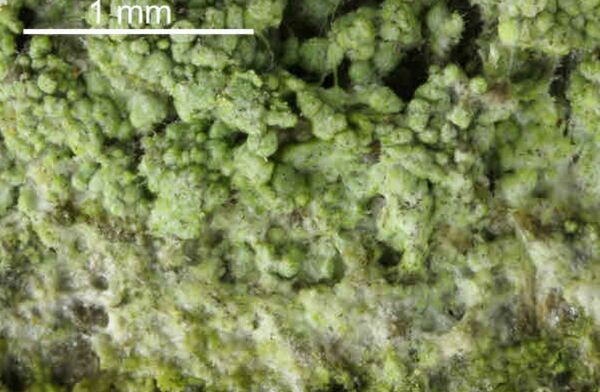
Felix Schumm – CC BY-SA 4.0
[16640], Germany, Rheinland-Pfalz, Naturpark Pfälzer Wald, ca. 2 km südlich von Hofstätten, am Weg zum Annweiler Forsthaus, 49.260193° N, 7.891891° E, 291 m. Leg. V. John, 03.09.2010 (BLAM-Exkursion)
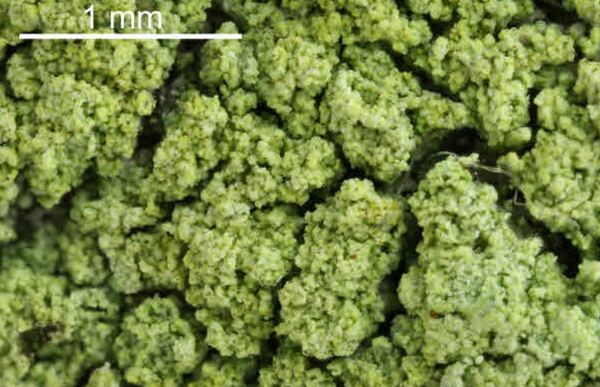
Felix Schumm – CC BY-SA 4.0
[16640], Germany, Rheinland-Pfalz, Naturpark Pfälzer Wald, ca. 2 km südlich von Hofstätten, am Weg zum Annweiler Forsthaus, 49.260193° N, 7.891891° E, 291 m. Leg. V. John, 03.09.2010 (BLAM-Exkursion)
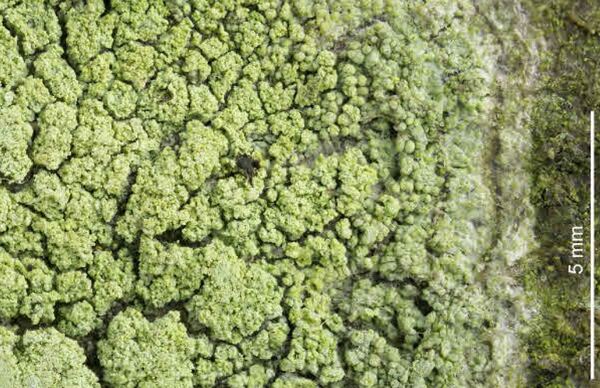
Felix Schumm – CC BY-SA 4.0
[16640], Germany, Rheinland-Pfalz, Naturpark Pfälzer Wald, ca. 2 km südlich von Hofstätten, am Weg zum Annweiler Forsthaus, 49.260193° N, 7.891891° E, 291 m. Leg. V. John, 03.09.2010 (BLAM-Exkursion)
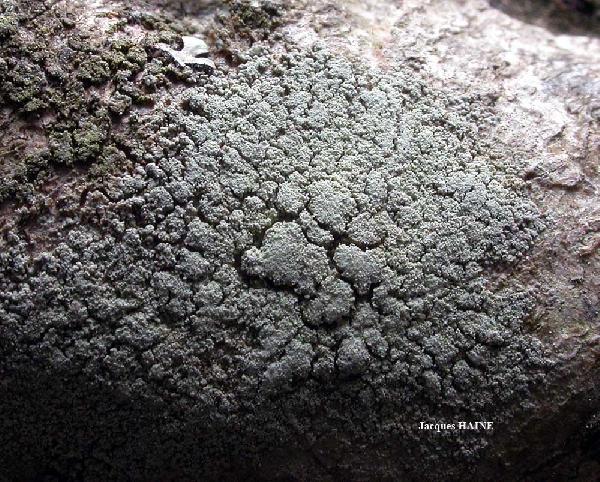
Jacques Haine - Source: http://www.lichensmaritimes.org/index.php?task=fiche&lichen=595&lang=en
France, Han sur Lesse
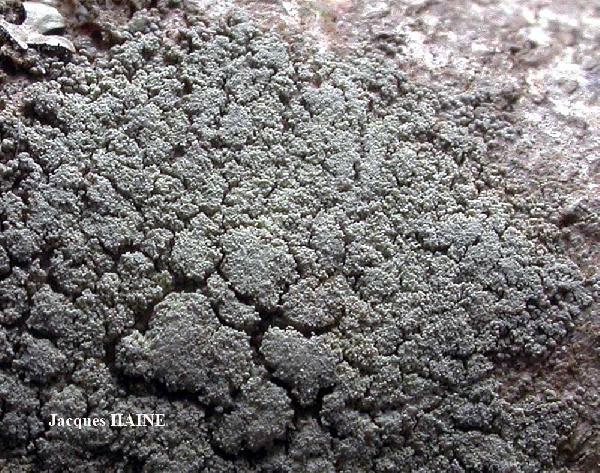
Jacques Haine - Source: http://www.lichensmaritimes.org/index.php?task=fiche&lichen=595&lang=en
France, Han sur Lesse
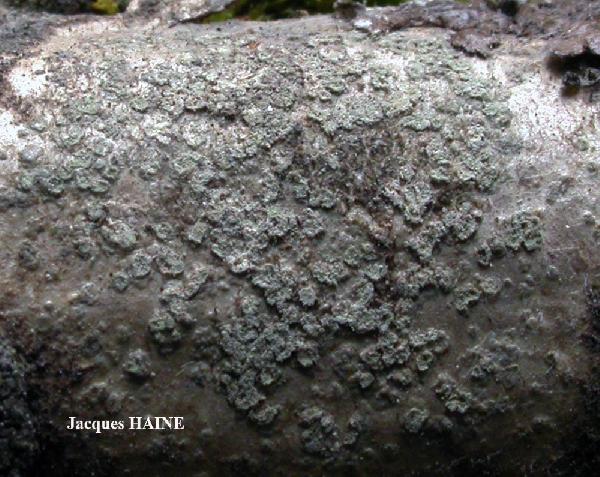
Jacques Haine - Source: http://www.lichensmaritimes.org/index.php?task=fiche&lichen=595&lang=en
France, Han sur Lesse
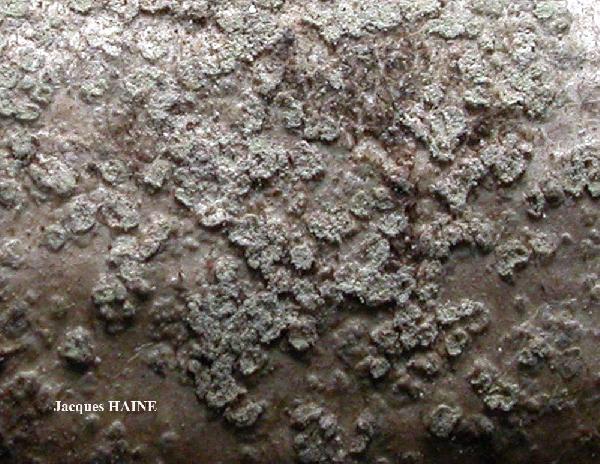
Jacques Haine - Source: http://www.lichensmaritimes.org/index.php?task=fiche&lichen=595&lang=en
France, Han sur Lesse

Felix Schumm - CC BY-SA 4.0
[VZR406], Bohemia austro-occidentalis, distr. Zelezná Ruda, montes
Šumava (Gabreta), in valle confluvii dextri vallis rivi "Debrnik", 750
m. Ad corticem Alni Incanae. Leg. T. Toensberg & A. Vezda,
13.10.1999, det. T. Toensberg. EX A. VEZDA: LICHENES RARIORES
EXSICCATI NR. 406.

Felix Schumm - CC BY-SA 4.0
[VZR406], Bohemia austro-occidentalis, distr. Zelezná Ruda, montes
Šumava (Gabreta), in valle confluvii dextri vallis rivi "Debrnik", 750
m. Ad corticem Alni Incanae. Leg. T. Toensberg & A. Vezda,
13.10.1999, det. T. Toensberg. EX A. VEZDA: LICHENES RARIORES
EXSICCATI NR. 406.
Growth form: Crustose
Substrata: bark
Photobiont: green algae other than Trentepohlia
Reproductive strategy: mainly asexual, by soredia, or soredia-like structures (e.g. blastidia)
Commonnes-rarity: (info)
Alpine belt: absent
Subalpine belt: absent
Montane belt: very rare
Dry submediterranean belt: extremely rare
Humid submediterranean belt: absent
Padanian area: absent
pH of the substrata:
| 1 | 2 | 3 | 4 | 5 |
Solar irradiation:
| 1 | 2 | 3 | 4 | 5 |
Aridity:
| 1 | 2 | 3 | 4 | 5 |
Eutrophication:
| 1 | 2 | 3 | 4 | 5 |
Poleotolerance:
| 0 | 1 | 2 | 3 |
Altitudinal distribution:
| 1 | 2 | 3 | 4 | 5 | 6 |
Rarity
absent
extremely rare
very rare
rare
rather rare
rather common
common
very common
extremely common
Loading data...
Occurrence data
Predictive map

Felix Schumm – CC BY-SA 4.0
[16640], Germany, Rheinland-Pfalz, Naturpark Pfälzer Wald, ca. 2 km südlich von Hofstätten, am Weg zum Annweiler Forsthaus, 49.260193° N, 7.891891° E, 291 m. Leg. V. John, 03.09.2010 (BLAM-Exkursion)

Felix Schumm – CC BY-SA 4.0
[16640], Germany, Rheinland-Pfalz, Naturpark Pfälzer Wald, ca. 2 km südlich von Hofstätten, am Weg zum Annweiler Forsthaus, 49.260193° N, 7.891891° E, 291 m. Leg. V. John, 03.09.2010 (BLAM-Exkursion)

Felix Schumm – CC BY-SA 4.0
[16640], Germany, Rheinland-Pfalz, Naturpark Pfälzer Wald, ca. 2 km südlich von Hofstätten, am Weg zum Annweiler Forsthaus, 49.260193° N, 7.891891° E, 291 m. Leg. V. John, 03.09.2010 (BLAM-Exkursion)

Felix Schumm – CC BY-SA 4.0
[16640], Germany, Rheinland-Pfalz, Naturpark Pfälzer Wald, ca. 2 km südlich von Hofstätten, am Weg zum Annweiler Forsthaus, 49.260193° N, 7.891891° E, 291 m. Leg. V. John, 03.09.2010 (BLAM-Exkursion)

Jacques Haine - Source: http://www.lichensmaritimes.org/index.php?task=fiche&lichen=595&lang=en
France, Han sur Lesse

Jacques Haine - Source: http://www.lichensmaritimes.org/index.php?task=fiche&lichen=595&lang=en
France, Han sur Lesse

Jacques Haine - Source: http://www.lichensmaritimes.org/index.php?task=fiche&lichen=595&lang=en
France, Han sur Lesse

Jacques Haine - Source: http://www.lichensmaritimes.org/index.php?task=fiche&lichen=595&lang=en
France, Han sur Lesse

Felix Schumm - CC BY-SA 4.0
[VZR406], Bohemia austro-occidentalis, distr. Zelezná Ruda, montes Šumava (Gabreta), in valle confluvii dextri vallis rivi "Debrnik", 750 m. Ad corticem Alni Incanae. Leg. T. Toensberg & A. Vezda, 13.10.1999, det. T. Toensberg. EX A. VEZDA: LICHENES RARIORES EXSICCATI NR. 406.



